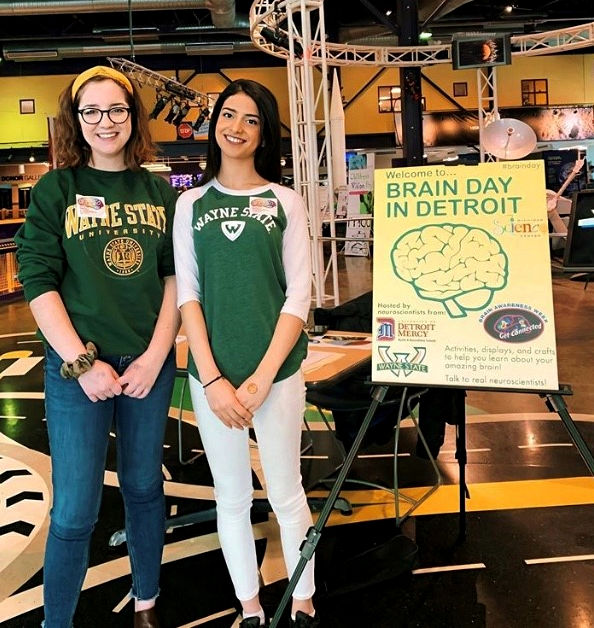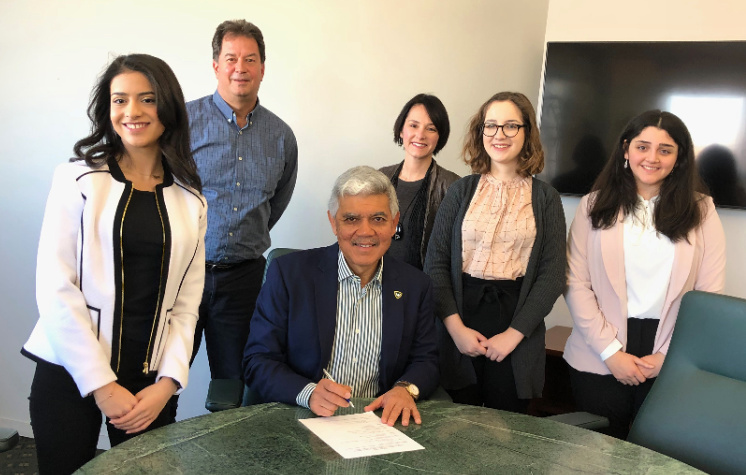
It was senior year of high school and Isabela Romano had finished reading Susannah Cahalan's memoir, Brain on Fire. Cahalan's horrific tale — chronicling her descent into madness as she suffered from what was discovered to be anti-NMDA autoimmune encephalitis — piqued Romano’s curiosity.
“I felt compelled to learn more about how our brain functions, both mentally and physically,” said Romano, now 20 and a Wayne State University neuroscience major in the College of Liberal Arts and Sciences. “What I really like about neuroscience is that the field is so interdisciplinary — a mix of both biological and psychological concepts, with many more subareas. Cahalan's memoir was the first time I realized it is possible for all of these fields to merge into one.”

When Romano came to Wayne State in 2018 as a biology major, however, the undergraduate interdisciplinary neuroscience program did not exist. One year later, the major became official and Romano jumped at the opportunity. But there was something missing.
“Right away, I realized there were no organizations or honors societies related to neuroscience. I saw it as an opportunity to start our own,” Romano said. “After doing some research, I came across Nu Rho Psi, the National Honor Society in Neuroscience, and I proposed the idea to Dr. Tom Fischer, the program director of neuroscience.”
On Sept. 16, the Wayne State neuroscience program inducted its inaugural chapter of Nu Rho Psi, which currently includes 20 charter, 12 provisional and 19 faculty members. WSU’s chapter becomes just the second chapter in the state, alongside Central Michigan University, and joins 92 universities around the country such as the University of Notre Dame, Ohio State University and the University of Pittsburgh.
Wayne State President M. Roy Wilson signed the group’s application this past spring, alongside student organizers and faculty advisors Fischer and Dr. Alana Conti from the School of Medicine’s Department of Psychiatry and Behavioral Neurosciences, whose involvement Romano credits with helping foster increased faculty interest the last few months.

“One of our goals for the Wayne State chapter is to emphasize research and professional development by establishing relationships with our faculty members,” said Romano, who is the chapter's president. “I'd say our student-to-faculty ratio is pretty good, so hopefully students will be able to take advantage of those opportunities.”
For Romano, what makes the university’s Nu Rho Psi chapter stand out is the ability to collaborate with WSU’s School of Medicine. Almost half of the chapter’s faculty members come from the medical school, from different areas such as the Department of Psychiatry and Behavioral Neurosciences or the Center for Molecular Medicine and Genetics. “Not all universities have the benefit of having a medical school so involved in an undergraduate society,” she said. “I think we are very fortunate in that regard.”
Romano said she is proud of her fellow board members — Noor Alesawy, vice president; Maryam Adel, secretary; and Maryam Abbawi, treasurer — in their efforts to put this society together. “But we wouldn't have been able to accomplish it all without the direction and guidance of our two amazing chapter advisors,” Romano said.
Fischer feels the same can be said, but in reverse.
“The student officers were a driving force in this, helping to put together our application packet, organizing student and faculty recruitment, and planning the first induction ceremony,” said Fischer, associate professor of psychology and director of the undergraduate neuroscience program. “We have faculty who will be members from both the medical school and main campus, so it is a true campuswide effort.”
While Romano never expected to co-found an honors society during college, she said the experience has been rewarding. After graduation — either spring or fall 2021 — Romano said she plans to take two years off to focus on medical school applications and the MCAT. “I hope to continue working as an assistant clinical study coordinator until I start medical school. As far as specialties go, I can imagine myself pursuing neurology, but it's too early to tell,” she said.
